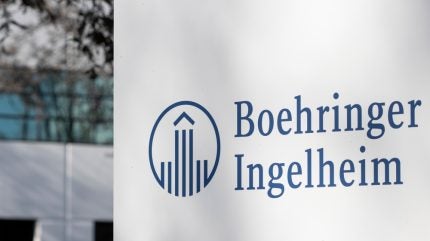
Boehringer Ingelheim currently does not have any approved therapies for ophthalmic indications, but the company is looking to change that via a new $250m licensing deal with a US biotech.
The deal is a global research collaboration and licensing agreement with US biotech Palatin Technologies, which will see the two companies develop a therapy for retinal diseases.

Discover B2B Marketing That Performs
Combine business intelligence and editorial excellence to reach engaged professionals across 36 leading media platforms.
Under the agreement, Palatin will receive upfront, development, regulatory and commercial milestone payments of up to €280m ($327m), as well as tiered royalties on net sales.
In a joint statement, Boehringer and Palatin placed a focus on diabetic retinopathy, an eye condition found in some diabetes patients that leads to irreversible vision loss. Palatin is developing molecules that modulate the activity of the melanocortin receptor system, a group of G protein-coupled receptors (GPCRs) important in maintaining ocular health and function.
The eye disease market is currently dominated by anti-vascular endothelial growth factor (VEGF) treatments. Regeneron and Bayer’s blockbuster ophthalmology drug Eylea (aflibercept) was once the top-selling drug, though its dominance has been significantly eroded in recent years. This has been due to the introduction of biosimilars on the market, along with rising uptake for Roche’s rival drug Vabysmo (faricimab).
Differentiating itself with a melanocortin receptor-mediated treatment, Boehringer is eyeing entry into the lucrative retinal disease market. Sales for drugs treating diabetic macular oedema, a complication of diabetic retinopathy, are forecast to generate more than $11bn across the seven major markets (France, Germany, Italy, Japan, Spain, the UK, and the US), according to GlobalData’s Pharma Intelligence Center.

US Tariffs are shifting - will you react or anticipate?
Don’t let policy changes catch you off guard. Stay proactive with real-time data and expert analysis.
By GlobalDataGlobalData is the parent company of Pharmaceutical Technology.
The deal with Palatin follows a similar agreement Boehringer signed with UK-based Re-Vana Therapeutics last month. The Germany-headquartered drugmaker outlaid more than $1bn for the rights to co-develop Re-Vana’s long-lasting ophthalmic drug candidates.
The big pharma company hopes the compounds born from the collaborations will bolster its eye health pipeline segment, which includes four drugs, all in Phase II trials. A vascular modulator is being evaluated in diabetic macular oedema, and a Sema3A antibody is being trialled for diabetic retinopathy. The company has two assets in development for geographic atrophy – a phospholipid modulator and an antibody fragment. Further details of the four Phase II trials have not been disclosed.
Boehringer Ingelheim’s eye health head Remko Bakker said: “Millions of people worldwide face a progressive decline in their independence and connection to the world due to vision loss caused by complications of diabetic retinopathy such as diabetic macular oedema.
“Given the high treatment burden associated with diabetic retinopathy, the potential of a melanocortin receptor agonist is a strategic fit with our pipeline focusing on addressing the three main drivers of retinal disease: inflammation, vascular dysfunction, and neurodegeneration. Importantly, this mechanistic approach may also be applicable in retinal diseases beyond diabetic retinopathy, where high unmet needs remain.”




